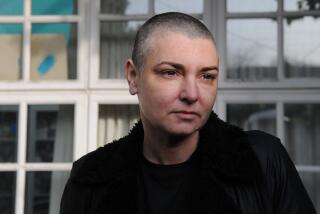From the Archives: Eartha Kitt dies at 81; TV’s Catwoman, sultry singer of ‘Santa Baby’
Eartha Kitt, a sultry singer, dancer and actress who rose from South Carolina cotton fields to become an international symbol of elegance and sensuality, has died. She was 81.
Kitt, whose saucy rendition of “Santa Baby” became a holiday pop music classic, died in Connecticut on Christmas Day. Family spokesman Andrew Freedman said Kitt was recently treated at New York’s Columbia Presbyterian Hospital for colon cancer.
A self-proclaimed “sex kitten,” famous for her catlike purr, Kitt was one of America’s most versatile performers, winning two Emmys and nabbing a third nomination. She also was nominated for several Tonys and two Grammys.
Her career spanned six decades, from her start as a dancer with the famed Katherine Dunham troupe to cabarets and acting and singing on stage, in movies and on television. She persevered through an unhappy childhood as a mixed-race daughter of the South and made headlines in the 1960s for denouncing the Vietnam War during a visit to the White House.
Once dubbed the “most exciting woman in the world” by Orson Welles, she spent much of her life single, though brief romances with the rich and famous peppered her younger years.
After garnering notice for singing “Monotonous” in the Broadway revue “New Faces of 1952,” Kitt appeared in “Mrs. Patterson” in 1954-55. (Some references say she earned a Tony nomination for “Mrs. Patterson,” but only winners were publicly announced at that time.) She also made appearances in “Shinbone Alley” and “The Owl and the Pussycat.”
Her first album, “RCA Victor Presents Eartha Kitt,” came out in 1954, featuring such songs as “I Want to Be Evil,” “C’est Si Bon” and the gold digger’s theme song “Santa Baby,” which is revived on radio each Christmas.
The next year, the record company released the follow-up album “That Bad Eartha,” which featured “Let’s Do It,” “Smoke Gets in Your Eyes” and “My Heart Belongs to Daddy.”
In 1996, she was nominated for a Grammy in the category of traditional pop vocal performance for her album “Back in Business.” She also had been nominated in the children’s recording category for the 1969 record “Folk Tales of the Tribes of Africa.”
Kitt also acted in movies, playing the lead female role opposite Nat King Cole in “St. Louis Blues” in 1958 and more recently appearing in “Boomerang” and “Harriet the Spy” in the 1990s.
On television, she was the sexy Catwoman on the popular “Batman” series in 1967-68, replacing Julie Newmar, who originated the role. A guest appearance on an episode of “I Spy” brought Kitt an Emmy nomination in 1966.
Kitt was plain-spoken about causes she believed in. Her antiwar comments at the White House came as she attended a luncheon held by Lady Bird Johnson.
“You send the best of this country off to be shot and maimed,” she told the group of about 50 women. “They rebel in the street. They don’t want to go to school because they’re going to be snatched off from their mothers to be shot in Vietnam.”
For four years afterward, Kitt performed almost exclusively overseas. She was investigated by the FBI and CIA.
“The thing that hurts, that became anger, was when I realized that if you tell the truth -- in a country that says you’re entitled to tell the truth -- you get your face slapped and you get put out of work,” Kitt told Essence magazine two decades later.
In 1978, Kitt returned to Broadway in the musical “Timbuktu!” -- which brought her a Tony nomination -- and was invited back to the White House by President Carter.
In 2000, Kitt earned another Tony nod for “The Wild Party.”
She played the fairy godmother in Rodgers and Hammerstein’s “Cinderella” in 2002.
As recently as October 2003, she was on Broadway after replacing Chita Rivera in a revival of “Nine.”
She also gained new fans as the voice of Yzma in the 2000 Disney animated feature “The Emperor’s New Groove.”
For years, Kitt was unsure of her birthplace or birth date. In 1997, a group of students at historically black Benedict College in Columbia, S.C., located her birth certificate, which showed she was born Jan. 17, 1927, in North, S.C.
In one of her three autobiographies, she wrote that her mother was black and Cherokee and her father was white, and she was left to live with relatives after her mother’s new husband objected to taking in a mixed-race girl.
An aunt eventually brought her to live in New York, where she attended the High School of Performing Arts, later dropping out to take various odd jobs.
By chance, she dropped by an audition for the dance group run by Dunham, a pioneering African American dancer. In 1946, Kitt was one of the Sans-Souci Singers in Dunham’s Broadway production “Bal Negre.”
Kitt’s travels with the Dunham troupe landed her a gig in a Paris nightclub in the early 1950s. She was spotted by Welles, who cast her in his Paris stage production of “Faust.”
That led to a role in “New Faces of 1952,” which featured such stars-to-be as Carol Lawrence, Paul Lynde and, as a writer, Mel Brooks.
Over the years, Kitt had liaisons with wealthy men, including Revlon founder Charles Revson, who showered her with lavish gifts.
In 1960, she married Bill McDonald but divorced him after the birth of their daughter. Her daughter, Kitt Shapiro, and two grandchildren survive her.
While on stage, Kitt was daringly sexy and always flirtatious. Offstage, however, she described herself as shy and almost reclusive, remnants of feeling unwanted and unloved as a child. She referred to herself as “that little urchin cotton-picker from the South, Eartha Mae.”
More to Read
Start your day right
Sign up for Essential California for the L.A. Times biggest news, features and recommendations in your inbox six days a week.
You may occasionally receive promotional content from the Los Angeles Times.






